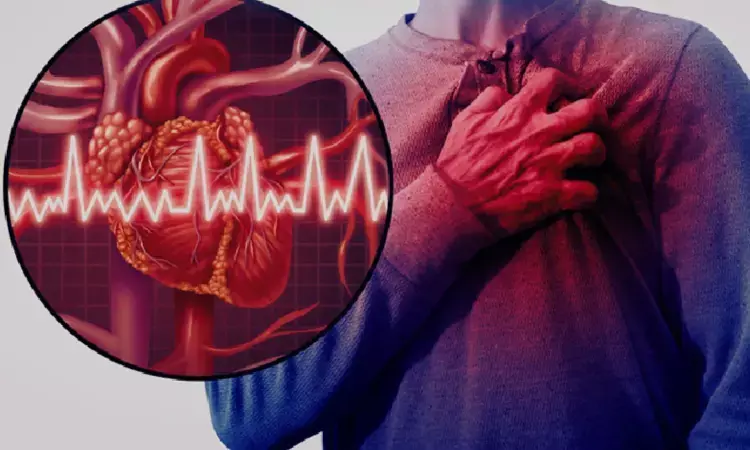- Home
- Medical news & Guidelines
- Anesthesiology
- Cardiology and CTVS
- Critical Care
- Dentistry
- Dermatology
- Diabetes and Endocrinology
- ENT
- Gastroenterology
- Medicine
- Nephrology
- Neurology
- Obstretics-Gynaecology
- Oncology
- Ophthalmology
- Orthopaedics
- Pediatrics-Neonatology
- Psychiatry
- Pulmonology
- Radiology
- Surgery
- Urology
- Laboratory Medicine
- Diet
- Nursing
- Paramedical
- Physiotherapy
- Health news
- Fact Check
- Bone Health Fact Check
- Brain Health Fact Check
- Cancer Related Fact Check
- Child Care Fact Check
- Dental and oral health fact check
- Diabetes and metabolic health fact check
- Diet and Nutrition Fact Check
- Eye and ENT Care Fact Check
- Fitness fact check
- Gut health fact check
- Heart health fact check
- Kidney health fact check
- Medical education fact check
- Men's health fact check
- Respiratory fact check
- Skin and hair care fact check
- Vaccine and Immunization fact check
- Women's health fact check
- AYUSH
- State News
- Andaman and Nicobar Islands
- Andhra Pradesh
- Arunachal Pradesh
- Assam
- Bihar
- Chandigarh
- Chattisgarh
- Dadra and Nagar Haveli
- Daman and Diu
- Delhi
- Goa
- Gujarat
- Haryana
- Himachal Pradesh
- Jammu & Kashmir
- Jharkhand
- Karnataka
- Kerala
- Ladakh
- Lakshadweep
- Madhya Pradesh
- Maharashtra
- Manipur
- Meghalaya
- Mizoram
- Nagaland
- Odisha
- Puducherry
- Punjab
- Rajasthan
- Sikkim
- Tamil Nadu
- Telangana
- Tripura
- Uttar Pradesh
- Uttrakhand
- West Bengal
- Medical Education
- Industry
Ivabradine did not reduce occurrence of myocardial injury after noncardiac surgery: ESC Study

Ivabradine did not reduce the occurrence of myocardial injury after noncardiac surgery (MINS), according to late-breaking research presented in a Hot Line session today at ESC Congress 2025.
MINS is a common and serious complication, which has been found to account for approximately 13% of all deaths within 30 days of surgery. Explaining the rationale of the PREVENT-MINS trial, Principal Investigator, Professor Wojciech Szczeklik from Jagiellonian University Medical College, Krakow, Poland, said: “It has been proposed that increased heart rate at the time of surgery leads to higher myocardial oxygen consumption, a supply-demand mismatch and myocardial injury. Giving beta-blockers around the time of surgery lowers heart rate and decreases the risk of myocardial infarction, but these benefits may be offset by increased risk of hypotension, death and stroke. Ivabradine is a currently available medicine used in angina and heart failure that more selectively slows heart rate than beta-blockers. The PREVENT-MINS trial assessed whether ivabradine could prevent MINS in patients after noncardiac surgery with, or at risk of, atherosclerotic disease.”
The double-blind, placebo-controlled, randomised PREVENT-MINS trial was conducted at 26 hospitals in Poland. Eligible patients were aged ≥45 years and had either established atherosclerotic disease (i.e. coronary artery disease, peripheral artery disease or prior stroke) or substantial risk factors for atherosclerotic disease (e.g. diabetes, hypertension and age ≥70 years). Patients were randomised 1:1 to receive ivabradine (5 mg orally twice daily for up to 7 days, starting one hour before surgery) or placebo. The primary outcome was MINS within 30 days from randomisation. The trial had intended to enrol around 2,500 patients; however, the independent Data Monitoring Committee recommended early termination in March 2025 for futility, based on the prespecified interim analysis.
All 2,101 participants who underwent randomisation were included in the intention-to-treat population. The median age was 70.0 years and 49.4% were women.
MINS occurred in 17.0% of patients in the ivabradine group and 15.1% in the placebo group (relative risk [RR] 1.12; 95% confidence interval [CI] 0.92 to 1.37; p=0.25). In prespecified subgroup analyses, ivabradine was associated with an increased risk of MINS among patients with a history of coronary artery disease (RR 1.49; 95% CI 1.03 to 2.16) but not among patients without a history of coronary artery disease (RR 0.98; 95% CI 0.78 to 1.24).
The intraoperative mean heart rate was lower in the ivabradine group by 3.2 beats per minute than in the placebo group, with no difference in intraoperative mean arterial pressure. Clinically important bradycardia was more common in the ivabradine group (RR 1.18; 95% CI 1.00 to 1.40).
Professor Szczeklik concluded: “Ivabradine did not reduce the risk of MINS in patients undergoing noncardiac surgery. Heart-rate lowering was modest and the possible higher MINS incidence in patients with known coronary artery disease is contrary to our original hypothesis. Further research is needed to establish a method to safely control the heart’s stress associated with noncardiac surgery.”
Reference:
Wojciech Szczeklik, Jakub Fronczek, Ivabradine in Patients Undergoing Noncardiac Surgery: a Randomized Controlled Trial, Circulation, https://doi.org/10.1161/CIRCULATIONAHA.125.076704
Dr Kamal Kant Kohli-MBBS, DTCD- a chest specialist with more than 30 years of practice and a flair for writing clinical articles, Dr Kamal Kant Kohli joined Medical Dialogues as a Chief Editor of Medical News. Besides writing articles, as an editor, he proofreads and verifies all the medical content published on Medical Dialogues including those coming from journals, studies,medical conferences,guidelines etc. Email: drkohli@medicaldialogues.in. Contact no. 011-43720751


